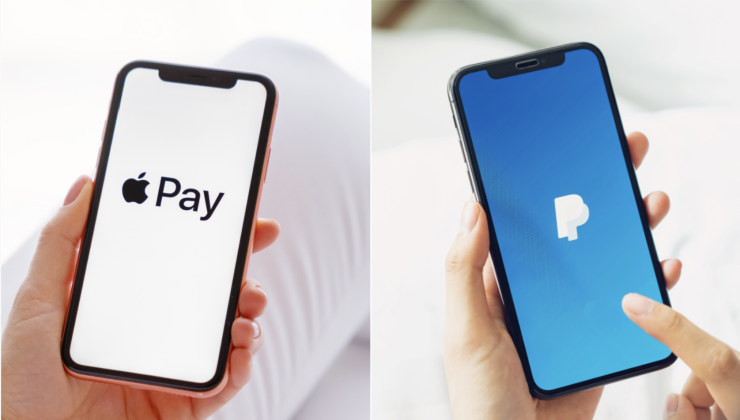PayPal sees signs of a Grinch-like holiday, but the company is preparing for harder times by cutting expenses and beginning a key collaboration with Apple that's likely to reap long-term benefits.
The PayPal and Venmo apps will soon connect to Apple's Tap to Pay technology, enabling merchants to accept contactless payments — including Apple Pay — through iPhones, PayPal CEO Dan Schulman told analysts on Thursday when announcing the company's third-quarter earnings.
Next year, PayPal users will also be able to add their PayPal and Venmo credit and debit cards to Apple Wallet, and PayPal will be one of the first payments platforms offering passkeys on Apple devices to replace passwords and streamline checkouts to just one or two clicks, Schulman said.
"We're both [PayPal and Apple] excited to put these into the market and dedicate resources to assuring that they're successful and just create a better value proposition for our mutual customers," Schulman said.
A merchant with a Venmo or PayPal business profile may enter a few pieces of identifying data and immediately accept payments on an iPhone through Tap to Pay, at a rate of 2.29% plus 9 cents per transaction, according to Schulman.
The moves come as PayPal prepares for a potentially hard winter as some economic signals darken.
Although PayPal posted robust revenue for the quarter that ended Sept. 30, and high-income consumers continued spending freely, PayPal noticed a troubling downturn in e-commerce sales during the final weeks of October, according to Gabrielle Rabinovich, senior vice president of investor relations, treasurer and acting chief financial officer.
"We have not seen the early start to the U.S. holiday [sales] season that we saw in 2021," Rabinovich said, adding she expects inflationary pressures alongside slowing global growth to weigh on discretionary spending during the fourth quarter and into next year.
PayPal's fourth-quarter growth will likely be in the single digits, and it's too early to provide a detailed outlook for 2023, Rabinovich said.
To prepare for a wide range of possible economic scenarios, PayPal is continuing to reduce its cost structure by driving efficiencies across the organization. The company aims to reach $900 million in cost savings by the end of this year and $1.3 billion next year, Schulman said.
PayPal also plans to push several enhancements it hopes will increase its market share by providing more value to consumers watching their own bottom lines in the rocky economy.
Schulman touted the recent in-app unification of PayPal Rewards with the company's e-commerce deals engine Honey, so users can manage discounts from offers and rewards in one place. Rewards can be redeemed as savings on PayPal checkouts, transferred to a bank account or used to fund a peer-to-peer payment or donation to a charity.
The long-promised partnership between Venmo and Amazon is finally coming to fruition, with certain Amazon customers now able to check out using Venmo. The option will become available to all users within the next several weeks, Schulman said.
The decision to support Apple Pay is a significant shift from
PayPal is moving away from QR codes as an in-store checkout method and pushing virtual cards instead within the PayPal app, which are more suitable for PayPal's thriving buy now/pay later lending operation, Schulman said.
While Schulman claims PayPal is one of the world's leading BNPL providers by volume, the company doesn't charge merchants a fee when closing loans with the "Pay in 4" model it uses to compete with BNPL fintechs including Affirm, Afterpay (a unit of Block) and Klarna.
Schulman instead sees BNPL as an essential element in PayPal's overall expanding payments ecosystem. "We're really trying to imagine BNPL as being fully omnichannel," he said, noting that consumers can use PayPal's app to convert a recent purchase into a four-segment interest-free installment loan.
PayPal's total payment volume reached $337 billion during the third quarter, up 9% from the same period in 2021. Cross-border payment volume fell slightly to $43 billion, reflecting slower activity between key international corridors.
Revenue during the third quarter rose 11% to $6.9 billion compared with the same period a year earlier. Operating income rose 4%, reaching $1.5 billion. PayPal added 2.9 million new accounts, reaching 432 million active accounts, including 90 million Venmo accounts.
PayPal stock initially dipped Thursday on the news, but it recovered to prior levels in early next-day trading. In a Friday note to investors, analysts at Morgan Stanley applauded PayPal's actions, including its new Apple agreement.
"We are encouraged that PayPal continues to grow share compared to underlying e-commerce and is making the right strategic moves to grow habituation and maintain this outperformance over the longer term," Morgan Stanley said.







